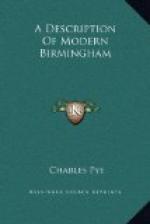The ancient pleasure grounds exhibit a great variety of pleasing objects, and also numerous curiosities; among others, a mill that was in being before the Norman conquest, it being mentioned in doomsday book. There is also Guy’s well, where this renowned champion was accustomed to slake his thirst, which is described by Leland as follows, it still remaining in the same state as it was then—“The silver wells in the meadows were enclosed with pure white sleek stones, like marble, and a pretty house, erected like a cage, one end only open, to keep comers from the rain.” The apartments under the chapel, where the chantry priests were used to reside, still remain entire, without having undergone any alteration. Near to this spot is Guy’s cave,
“Where with his hands he hew’d
a house,
Out of a craggy rock of stone,
And lived, like a palmer, poor,
Within that house alone.”
This bears the appearance of being a natural eave, for the upper part does not exhibit any marks where the tool has been made use of, but the lower part does; and here, tradition says, this mighty warrior was interred, and also his wife, fair Phillis. Over this cave is fair Phillis’s walk, who, it is related, was accustomed to resort here, whilst her husband, though not known to her as such, was performing his devotions in the cave below. From these delightful and romantic walks there are numerous opportunities for an expert draughtsman to exercise his abilities.
Leamington Priors.
The distance between Warwick and Leamington is only two miles, and there are two distinct roads, both of them excellent; and whether a person rides or walks, if the mind is susceptible of pleasing ideas, neither time nor fatigue will be thought of. The roads about Leamington are in excellent order, and present numerous delightful and picturesque views, which are fully described by Mr. Field, and also by Mr. Moncrief in his Guide to Leamington, wherein he has introduced some appropriate, entertaining, and amusing poetry. Whoever resorts to these saline springs in search of amusement, if he has money and time at command, cannot fail, during the season, between May and November, of being highly gratified, except the mind is entirely depraved. To every visitant, the guide of Mr. Moncrief will not only be useful but entertaining. The poetical epistles of Miss Fidget are not only descriptive but very humorous, and the poetry of Mr. Pensile is very appropriate.
Before Leamington rose into esteem, there was a facetious man resided there, named Benjamin Satchwell, by trade a shoemaker, who, when any differences arose among the villagers, he was in general the mediator; they not being at that time cursed with either a wrangling lawyer or an hypocritical methodist. He was also the village poet, and frequently exercised his talents in praise of the waters, and likewise of any respectable person who came with intent to derive benefit from




